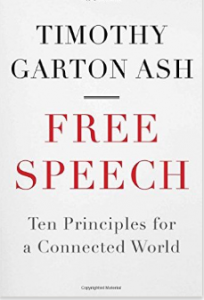
“Toleration makes difference possible, difference makes toleration necessary”

Defend your right to free speech, should fears over security and social cohesion curtail it. Every person with an internet connection now has instant access to diversified opinions and crucially a platform to air their own opinions. In Free Speech, Timothy Garton Ash, scholar, and a journalist, direct us how to think freely and to live civilly in our connected world of diversity. He reports from a decade of thinking about how societies can live in robustly propagating free speech. Timothy a professor of European History, has created in Oxford a website manned by multilingual staff with docs like “Free Speech debate”. The book describes 10 principles that Gordon Ash believes necessary for speech to be free. These are freedom to seek and impart information and ideas to eschew violent intimidation to erect no taboo against any form of knowledge, also ensure that media are free from interference and manipulation and are uncensored, diverse, trustworthy, to express conflicting and diverse views with robust civility to respect the freedom of religious believers, not necessarily what they believe, to protect the privacy save where exposure is deemed to be in public interest. To challenge those limits on freedom of information justified by the state on the grounds of security, to defend the internet against public or private encroachment and to cultivate courage in the face of threats to the expression of disputed ideas.
Anyone can publish anything we like and potentially reach an audience of millions like the popularity of YouTube, Rude Tube, Facebook, Instagram. Never there was a time when the evils of unlimited speech followed so easily across frontiers with no borders or limits, violent intimidation, a gross violation of privacy, tidal waves of abuse across all cultural divides we must agree on how we disagree.
No platform policies adopted by several student groups seeking to ban speakers on the grounds that views such as those of Germaine Greer on Transsexuals should not be heard. Protests have centred on the ”Rhodes must fall” campaign directed at the statue of Cecil Rhodes outside Oriel College in Oxford. Timothy sees the spreading of the habit of taking offence becoming a veto on all speech the offended regarded as threatening or depriving them of a safe space and says issues may be ruled off limits as they might offend somebody. On the free speech website, he quoted the exemplary policy of the University of Chicago’s former presidents Hanna Holborn Gray “Universities should be expected to provide the conditions within which hard thought and therefore strong disagreement, independent judgement and the questioning of stubborn assumptions can flourish in an environment of the greatest freedom”.
The books main theme is the belief that voice, be it ever so base, is best opposed by more voice. Garton Ash himself was once involved in a debate a decade ago, on the anti-Islamist campaigner Ayaan Hirsi Ali, whom he called slightly simplistic enlightenment fundamentalist which is classic example of his core idea, voice countering voice and changing thinking minds.
He picks a quote from Michael Walzer “Toleration makes difference possible, difference makes toleration necessary.”
Free Speech; Ten principles for a Connected World by Timothy Garton Ash
Atlantic £20 Yale University Press $30, 512 pages

